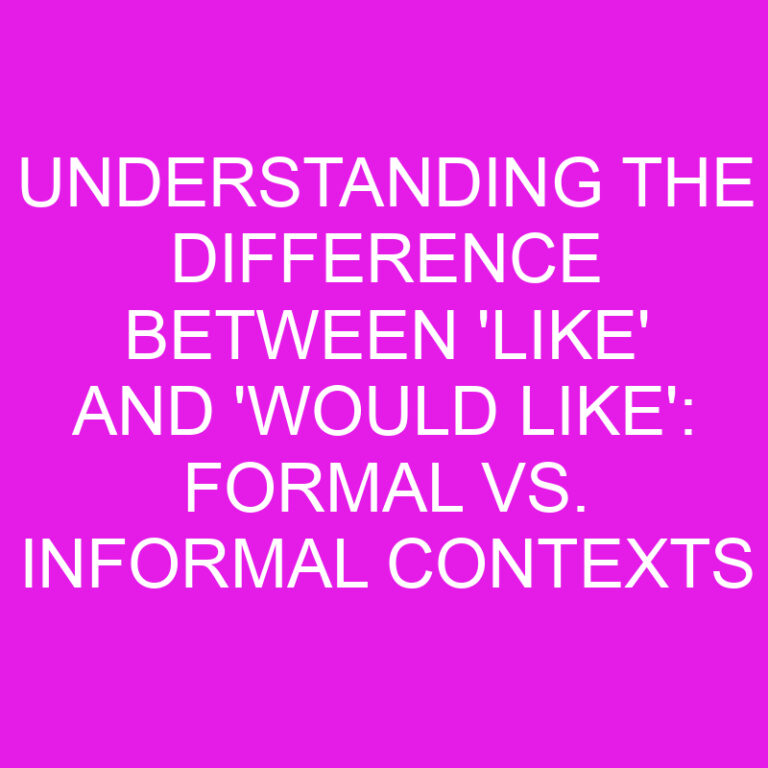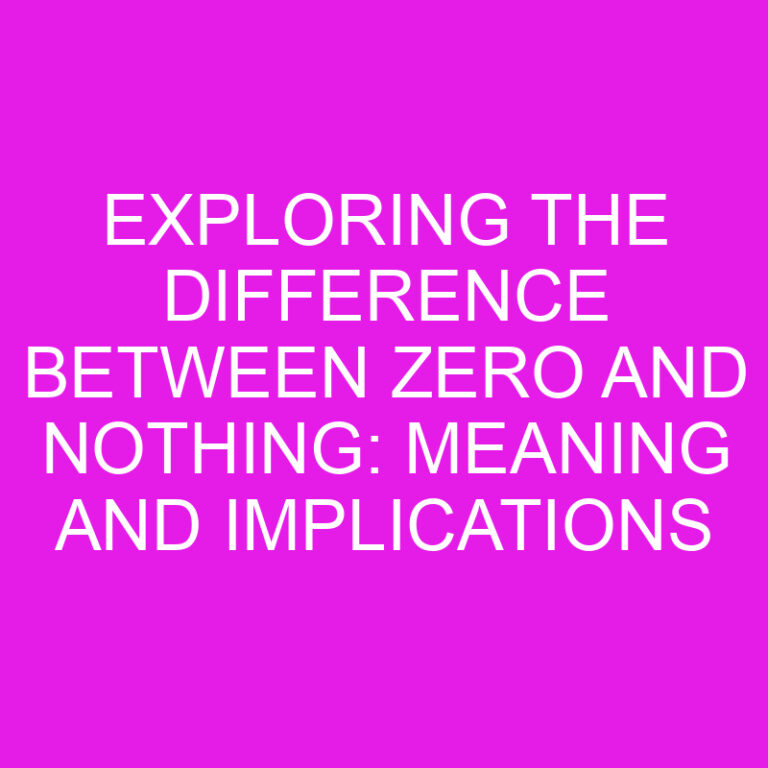
Have you ever wondered about the subtle nuances of English grammar? Well, today I’m here to shed some light on the difference between two commonly used words: shall and may. While they may seem similar at first glance, understanding their distinctions can greatly enhance your command of the English language. So, let’s dive in and explore the intricacies of these two words and how they shape our communication.
When it comes to expressing obligation or duty, shall takes the lead. It signifies a stronger sense of requirement or necessity, often used in formal or legal contexts. On the other hand, may suggests permission or possibility, allowing for more flexibility and choice in our language. By grasping the contrasting roles of shall and may, you’ll be able to navigate conversations with precision and clarity, ensuring effective communication in various situations.
Post Contents
Key Takeaways
- Shall is used to express obligation or duty, while may suggests permission or possibility.
- Shall is often used in formal or legal contexts, indicating a stronger sense of requirement or command, whereas may allows for flexibility and choice in language.
- Shall is more definitive and indicates a requirement or command, while may is more open-ended and implies optional or discretionary action.
- Understanding the nuances between shall and may can greatly enhance your command of the English language and improve communication skills in various situations.
- The proper usage of shall and may significantly impacts the meaning of sentences, so pay close attention to their intended purpose and choose the appropriate one to convey your message effectively.
Understanding Shall and May
Understanding Shall and May
When it comes to English grammar, understanding the distinctions between certain words is crucial for effective communication. Two such words that often cause confusion are “shall” and “may.” In this section, I’ll discuss the differences between these two words and how they are used in the English language.
Shall is commonly used to express obligation or duty. It implies a sense of certainty and is often used in formal or legal contexts. For example, “You shall attend the meeting” implies that attending the meeting is mandatory and non-negotiable. It indicates a requirement or a command.
On the other hand, may suggests permission or possibility. It allows for more flexibility and choice in language. For instance, “You may attend the meeting” indicates that attending the meeting is optional and up to the individual’s discretion. It implies that there is a possibility or an opportunity to do something.
It’s important to note that while shall expresses obligation, may offers a suggestion or grants permission. Shall is more definitive, while may is more ambiguous and open-ended. Understanding the distinction between these words can greatly enhance your command of the English language and improve your communication skills in various situations.
To summarize:
| Shall | May |
|---|---|
| Expresses obligation or duty | Suggests permission or possibility |
| Used in formal or legal contexts | Allows for flexibility and choice |
| Indicates a requirement or command | Implies optional or discretionary action |
By grasping the nuances of shall and may, you can use these words accurately in your speech and writing, ensuring clarity and precision in your communication.
Remember, the proper usage of shall and may can significantly impact the meaning of your sentences. So, next time you encounter these words, pay close attention to their intended purpose, and choose the appropriate one to convey your message effectively.
Expressing Obligation and Duty
When it comes to expressing obligation or duty in English grammar, the words “shall” and “may” play different roles. Understanding these distinctions is crucial for effective communication.
To begin with, “shall” is often used to convey a sense of obligation or duty. It suggests that something is mandatory or required. This word is commonly used in formal or legal contexts where there is a clear expectation or directive. For example, “I shall submit the report by the end of the day” implies a firm commitment to completing the task.
On the other hand, “may” is used to suggest permission or possibility. It allows for flexibility and choice in language. This word indicates that something is not mandatory or obligatory but rather optional. For instance, “I may attend the conference next week if my schedule permits” implies that the decision to attend is contingent upon other factors.
It’s important to note that the use of “shall” versus “may” can signify different levels of certainty. “Shall” implies a higher degree of certainty, while “may” suggests a lesser degree of certainty. For example, “The project shall be completed by the end of the month” conveys a strong commitment to meet the deadline, whereas “The project may be completed by the end of the month” indicates that there is a chance of meeting the deadline, but it is not certain.
Moreover, the choice between “shall” and “may” also relates to discretion. “Shall” implies a more mandatory requirement, leaving little room for discretion. On the contrary, “may” allows for more freedom and choice, granting the individual the power to decide. For instance, “Employees shall submit their expense reports within three business days” leaves no room for discretion, whereas “Employees may choose to submit their expense reports within three business days” offers more flexibility.
Comprehending the nuances between “shall” and “may” is essential for conveying obligation and duty accurately in English grammar. While “shall” denotes a stronger sense of obligation, “may” grants permission or possibility, providing more flexibility and choice. By using these words appropriately, we can enhance clarity and precision in our communication.
Shall: The Stronger Sense of Requirement
When it comes to expressing obligation or duty in English grammar, the word “shall” carries a stronger sense of requirement. It is often used in formal or legal contexts to convey a mandatory or necessary action.
Using “shall” in a sentence implies a higher degree of certainty compared to “may.” It suggests that the action described will definitely take place or that it is a firm requirement. For example:
- “You shall submit your report by the end of the week.” (implying a strict deadline)
- “We shall not tolerate any misconduct.” (implying zero tolerance for misconduct)
By using “shall,” you are asserting the importance and necessity of the action, leaving little room for discretion or choice. It is a powerful word that carries weight and authority in language.
However, it’s important to note that the use of “shall” has become less common in contemporary English. It is mostly reserved for formal or legal documents, agreements, or contracts. In everyday spoken or written language, “shall” is often replaced with “will” or other variants.
Understanding the stronger sense of requirement that “shall” carries can help you communicate with clarity and precision, especially in situations where obligations and duties need to be clearly outlined. By using “shall,” you can convey a sense of importance and urgency, ensuring that the message resonates effectively.
So, when it comes to expressing a stronger sense of requirement in English grammar, “shall” is your go-to word. Its use provides a clear and unequivocal statement of obligation or duty, leaving no room for ambiguity or doubt.
May: Permission and Possibility
When it comes to English grammar, the word “may” plays a crucial role in conveying both permission and possibility. Understanding the distinction between these two elements is essential for effective communication. Let’s delve into the nuances of “may” in more detail.
Permission
“May” is often used to grant or seek permission. It suggests that someone has the authority or capability to allow or do something. For instance, if you need to ask for permission to leave early from work, you might say, “May I leave a little early today?” The use of “may” in this context indicates that you are seeking permission from someone in authority.
It’s important to note that “may” is generally considered more polite and formal than other alternatives like “can” or “could.” While “can” and “could” also express permission, they have a slightly different connotation. “May” implies a sense of proper etiquette and respect, which can be especially useful in professional or formal interactions.
Possibility
In addition to conveying permission, “may” is also commonly used to express possibility. It suggests that something is likely or could happen. For example, you might hear someone say, “It may rain this afternoon,” indicating the possibility of precipitation later in the day.
The use of “may” to express possibility allows for more flexibility and uncertainty compared to using more definitive terms like “will” or “shall.” By incorporating “may” into your language, you can indicate that there is a chance or likelihood of something occurring without committing to a certain outcome.
Understanding the dual role of “may” in expressing both permission and possibility is crucial for effective communication. It allows us to navigate conversations and situations with clarity and precision.
In the next section, I’ll discuss the importance of context and the impact it has on the use of “shall” and “may” in various scenarios.
When it comes to using the words “shall” and “may” in English grammar, precision is key. These seemingly small differences in language can have a significant impact on how our intentions are understood in conversations, especially in formal or legal contexts. Here, I’ll delve into the nuances of “shall” and “may” to help you navigate conversations with confidence and clarity.
Understanding the Role of “Shall” in Expressing Obligation and Duty
In the realm of obligations and duties, “shall” takes center stage. It conveys a sense of mandatory or required action, leaving little room for discretion. When we use “shall,” we are implying a higher degree of certainty and a more mandatory requirement compared to “may.” As such, “shall” is often reserved for formal or legal documents, agreements, or contracts. Its usage signifies a firm commitment to fulfilling a specified obligation.
Let’s take a look at an example: “I shall deliver the report by tomorrow.” In this sentence, the use of “shall” clearly indicates a mandatory and non-negotiable commitment to delivering the report. There is no room for interpretation or choice.
Exploring the Flexibility of “May” in Granting Permission and Expressing Possibility
On the other hand, “may” provides a greater sense of flexibility and choice. It is commonly used to grant or seek permission, indicating that someone has the authority or capability to allow or do something. In addition to granting permission, “may” also plays a role in expressing possibility, suggesting that something is likely or could happen.
For instance, consider the sentence “You may leave the meeting early if you need to.” In this scenario, “may” functions to grant permission to leave the meeting early, allowing the individual the freedom to make the choice. Alternatively, when we say “It may rain later,” we are expressing the possibility that rain is likely to occur, but it is not certain.
Understanding the dual role of “may” in expressing both permission and possibility is crucial for effective communication. By using “may” appropriately, we can convey our intentions more precisely and ensure that our messages are accurately interpreted by others.
Conclusion
Understanding the distinctions between “shall” and “may” in English grammar is crucial for effective communication. The use of “shall” conveys obligation or duty, often in formal or legal contexts, while “may” suggests permission or possibility, allowing for more flexibility in language. By using “shall” appropriately, we can convey a sense of mandatory action and a higher degree of certainty. On the other hand, “may” grants permission and indicates the possibility of something happening. It is important to use these words accurately to ensure that our intentions are conveyed precisely and that others interpret our messages correctly. Whether we are drafting a formal document or engaging in everyday conversation, understanding the nuances of “shall” and “may” will help us communicate effectively and avoid any misunderstandings. So, next time you reach for these words, remember their distinct meanings and choose the right one to convey your message with clarity and precision.
Frequently Asked Questions
Q: What is the difference between “shall” and “may” in English grammar?
A: “Shall” expresses obligation or duty, often in formal or legal contexts. “May” suggests permission or possibility, allowing for more flexibility and choice in language.
Q: How are “shall” and “may” used?
A: “Shall” conveys a higher degree of certainty and a more mandatory requirement, often used in formal or legal documents. “May” is used to grant permission or indicate possibility.
Q: When should I use “shall”?
A: Use “shall” when you want to express a mandatory or required action, typically in formal or legal documents, agreements, or contracts.
Q: When should I use “may”?
A: Use “may” when you want to grant permission or indicate possibility. It is commonly used in everyday language to express both permission and the likelihood of something happening.
Q: Why is it important to understand the difference between “shall” and “may”?
A: Understanding the distinctions between “shall” and “may” is crucial for effective communication. Using them appropriately ensures precise intentions and accurate interpretation by others.






